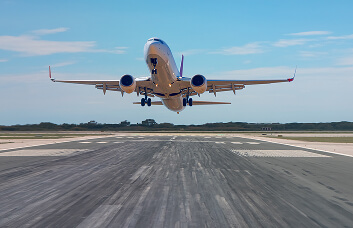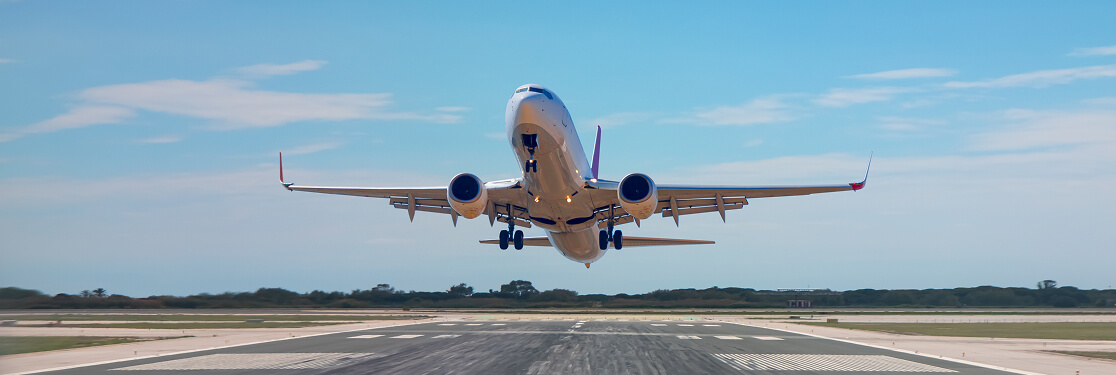Top Travel Insurance for Flights
Several policies stand out among the competition as the best travel insurance for flights. The following plans provide superior coverage for the most common flight-related travel disruptions like flight cancellations, trip delays, missed connections, and mishandled luggage.
We analyzed 100+ flight travel insurance policies from the nation’s top insurance companies. See a full list of the best flight insurance plans for 2025.
What is Flight Insurance?
Flight insurance, also known as airline ticket insurance, is a specialized type of single-trip travel insurance that provides financial protection if you encounter flight cancellations, significant delays, or baggage issues while traveling via a commercial airline. Some flight insurance plans can also offer medical coverage for the duration of your trip.
- Flight Insurance From Airlines
- Flight Insurance From Third-Party Providers
- What Does Flight Insurance Cover?
- What Does Flight Insurance Not Cover?
- How Much Is Flight Insurance?
- How Does Flight Insurance Work?
- How to Choose the Right Flight Insurance Plan
- Is Flight Insurance Worth It?
- FAQs: Flight Insurance
- Related Articles
Here are a few main benefits of travel insurance for flights:
- Offers peace of mind leading up to a flight
- Covers unexpected flight cancellations
- Reimburses you for significant delays & missed connections
- Provides stipends if your luggage is lost or delayed
- Can cover medical emergencies
You can buy flight insurance directly through the airlines, but comprehensive plans are also available through third-party travel insurance providers. To ensure you get the most value for your money, we recommend comparing plans and prices from the nation's top providers.
Flight Insurance From Airlines
Major airlines often partner with large travel insurance companies to offer basic trip protection to their customers. This coverage is often specific to your flight and is not intended to cover the entirety of your trip.
- Convenience: Buying your airfare and flight insurance all in one place can be a big time saver for people not interested in comparing coverage and prices.
- Fewer decisions to make: Most airlines only offer one or two plans to passengers, with little to no add-ons. This can reduce the decision load, which some people may find helpful.
- Tailored to flight-related coverage: Plans offered by airlines are geared heavily to flight-related coverage, which may be all some travelers need.
- See our full review of flight insurance policies from major airlines.
Flight Insurance From Third-Party Providers
Most travel insurance companies offer flight protection as part of their comprehensive travel insurance policies. The benefit of buying flight insurance through third-party travel insurance providers is that you can often find better coverage at a lower price.
Benefits of buying travel insurance from a third-party provider:
- More Comprehensive Coverage: Covers a wider range of travel risks, including medical emergencies, trip interruptions, and even adventure sports.
- Competitive Pricing: Shopping around allows you to see how various plans compare when it comes to pricing and coverage.
- More Customization: Many independent providers allow you to enhance your coverage with add-ons and upgrades.
Squaremouth can help you quickly and easily compare travel insurance plans from multiple providers at once. This is ideal for finding the best travel insurance coverage at affordable prices. Our plans also include ample options for customization through add-ons.
Start a quote to see travel insurance plans and prices for your trip.
What Does Flight Insurance Cover?
Unlike policies purchased directly through airlines, flight travel insurance plans from independent providers protect you for the entirety of your trip, beyond just your time in the sky. Flight insurance coverage varies by provider, but most offer the coverage listed below.
Trip Cancellation coverage can reimburse up to 100% of your air travel expenses and other non-refundable trip costs if your trip is cancelled for a covered reason, such as a natural disaster, pilot strike, or inclement weather. Without this coverage, airlines may only offer a partial refund or charge hefty rebooking fees.
Flight insurance can compensate you for significant delays (typically 3+ hours). This coverage can pay for unexpected costs related to food, overnight lodging, and rebooking fees.
If an unexpected travel delay results in you missing your connecting flight, many flight insurance policies will cover the cost to make new travel arrangements to catch up to your trip.
Flight insurance plans can cover you for unexpected medical emergencies while traveling, including hospital stays, doctor visits, and prescription medication. This is ideal for trips abroad.
Trip Interruption coverage can cover the cost of unused legs of your flight or for returning home if you are forced to end your trip early due to an unforeseen event, such as a natural disaster or personal emergency.
Airlines mishandle millions of bags each year. Most flight travel insurance plans include compensation and reimbursement for stolen or lost baggage as well as Baggage Delay coverage, ensuring you’re not stuck without your belongings.
Many flight insurance plans also include some form of accidental death and dismemberment (AD&D) coverage. This is a form of travel life insurance that can offer financial compensation for AD&D caused by a common carrier.
What Does Flight Insurance Not Cover?


Common flight travel insurance exclusions include:
- Voluntary Cancellations: Travel insurance won’t cover your flight if you cancel on a whim, change your mind, have a planning conflict, or for other voluntary reasons. You can get coverage for this with a Cancel for Any Reason (CFAR) travel policy.
- Pre-Existing Medical Conditions: Some flight insurance policies won’t cover medical expenses relating to existing health issues unless you purchase a policy with coverage for pre-existing conditions.
- Acts of War or Civil Unrest: Most policies exclude coverage for disruptions caused by war, civil unrest, or government travel bans.
- Alcohol- or Drug-Related Incidents: If you suffer financial loss due to an issue that arises due to intoxication, your claim may be denied.
- High-Risk Activities: Sports like skydiving, scuba diving, or mountaineering often require additional adventure-sports coverage.
As coverage varies based on the individual plan you choose, it’s important to review the fine print to understand its exact limitations and policy exclusions.
How Much Is Flight Insurance?
On average, flight insurance costs $30 per day as part of a comprehensive trip protection plan.
This figure is based on Squaremouth sales data from travelers who purchased flight insurance in the past 12 months. Squaremouth visitors spend an average of $415 for comprehensive travel insurance with flight coverage, and have an average trip length of 14 days.
It’s important to note that this cost reflects more than just flight protection. Comprehensive plans typically include emergency medical coverage, trip cancellation and interruption reimbursement, baggage protection, and other benefits.
Travel insurance companies will take into account your age, trip length, trip costs, destination, and coverage needs when determining premiums. The type of policy you choose will also impact the amount you pay for coverage.
As a rule of thumb, you can expect to pay 4%-10% of your total trip cost for a policy with flight coverage. For example, protecting a $5,000 trip may cost anywhere from $200 to $500.
For exact pricing, we recommend getting a flight insurance quote and comparing plans side-by-side.
How Does Flight Insurance Work?

Flight insurance provides reimbursement if your trip is affected by unexpected flight cancellations, lengthy delays, medical emergencies, mishandled luggage, and more.
Plans sold on Squaremouth come with 24/7 emergency assistance services to help you manage unforeseen travel emergencies and disruptions. If you have an issue with your flight, you can simply reach out to your travel insurance’s travel assistance hotline for support. The agents can help you find a solution to your travel issues, which can include rebooking or filing a claim for reimbursement.
Most plans require you to file a claim with your insurance company and provide supporting documentation to receive a reimbursement. This process can take roughly 4-6 weeks.

How to Choose the Right Flight Insurance Plan
Finding the best flight insurance plan comes down to understanding your options and choosing coverage that fits your needs. We recommend taking a moment to get several flight insurance quotes and compare plans to ensure you get adequate protection at the right price.
Here are our tips for finding the best flight insurance plan for your needs:
Websites like Squaremouth allow you to quickly compare travel insurance plans from top providers side by side. These comparison tools show you the price of each plan with detailed explanations of what's included. You can even filter for exactly what types of insurance benefits and limits you are looking for to quickly find a plan that meets your needs.
Many policies offered directly through airlines do not include coverage for medical emergencies or medical evacuations. If you’re planning international travel, we strongly suggest third-party policies that provide well-rounded protection for the entirety of your trip.
Since each policy and provider is different, we recommend reading the fine print to understand what’s excluded from the policy before you buy it. Refer back to our list of common exclusions above.
Many policies offer optional add-ons that can make your policy even more comprehensive. Some of the most popular add-ons commonly found in flight insurance plans include Cancel for Any Reason (CFAR) coverage and Rental Car Damage protection.
Is Flight Insurance Worth It?


Although flight insurance isn’t always necessary, it can save you a lot of time and money when travel headaches strike. The comprehensive coverage it offers is well worth the price, and you’ll likely be glad you bought it if you are ever forced to use it.
Flight insurance is worth buying for your next trip if you meet any of the following scenarios:
- You booked a non-refundable or expensive international trip
- You are traveling during high-risk seasons (e.g., hurricane season or winter holidays)
- Your trip involves multiple connecting flights or tight schedules
- You plan to travel with children, seniors, or someone with health concerns
- You don’t have the financial capacity to pay for unexpected disruptions, delays, cancellations, or lost baggage out of pocket.
Ultimately, whether flight insurance is worth it for you depends on your unique travel situation, the cost and complexity of your trip, and your personal risk tolerance. For some travelers, insurance might be a wise investment. For others, it could be an unnecessary added expense.
Browse Other Policy Types
FAQs: Flight Insurance
Squaremouth shares its tips and recommendations based on the most frequently asked questions from passengers.
Yes, you can purchase travel insurance anytime after booking your flight up until your departure date. With that said, it’s best to buy coverage as soon as possible.
The earlier you purchase, the more coverage options you’ll have. Buying travel insurance early also allows you to qualify for time-sensitive benefits like pre-existing condition waivers and Cancel for Any Reason (CFAR) coverage.
Trip insurance covers flight cancellations and delays that result from covered events, such as inclement weather or a mechanical breakdown. In the event your travel plans are impacted, your policy may cover the cost to book new travel arrangements.
Travel insurance does not cover voluntary changes to your plans, like wanting a new departure time or no longer wanting to travel. For the most cancellation flexibility, purchase a policy that includes CFAR insurance. This benefit can provide partial reimbursement of your trip costs if you cancel for an uncovered reason.
Flight cancellation insurance can reimburse you for non-refundable travel expenses, including airline tickets, if you cancel your trip for a covered reason. Most plans cover cancellations relating to an unexpected illness, injury, family emergency, or severe weather events.
If your flight is disrupted and causes financial loss, you may be eligible for reimbursement through your travel insurance policy.
To request this reimbursement, you will need to file a travel insurance claim with your provider as soon as it is safe to do so using. The claims process typically involves the following steps:
- Confirm Coverage: Review your policy documentation or speak with your provider to confirm that your disruption is eligible for reimbursement.
- Gather Documents: Your provider will likely request receipts, booking confirmations, and other forms of documentation that support your claim.
- Fill Out a Claim Form: Most travel insurance companies allow you to complete a claim form online or through a mobile app. Be sure to attach all necessary documentation.
- Submit & Monitor: When ready, submit your claim and await a response. Check back regularly to get status updates or to see if additional documentation has been requested.
Airline travel insurance is typically offered during the booking process and provides basic protection focused on flight-related issues, like cancellations or delays. It’s fast and convenient—just a few extra clicks—but it usually comes from a single provider with limited customization.
Third-party flight travel insurance, on the other hand, gives you access to a broader selection of policies from multiple insurers. You can shop directly or use a comparison site like Squaremouth to get multiple flight insurance quotes and find a plan that better fits your trip.
Here’s how they compare:
- Options: Airlines usually offer one plan. Sites like Squaremouth let you compare over 100 policies from top insurers.
- Coverage: Airline insurance often covers only basic disruptions. Third-party plans can include coverage for medical emergencies & evacuations, baggage loss, and even “Cancel for Any Reason” (CFAR) options.
- Cost: Prices vary, and similar coverage might cost more through an airline. Comparing third-party plans can help you find better value.
Related Articles
Resources 10 min read
6 Best Flight Insurance Companies in 2025Travel Advice 8 min read
The Traveler’s Guide to Airline Travel InsuranceResources 10 min read
6 Best Flight Insurance Companies in 2025
We analyzed 100+ policies and found the best flight insurance [...]
Read MoreTravel Advice 8 min read
The Traveler’s Guide to Airline Travel Insurance
Airline flights can be disrupted for bad weather, mechanical issues, and any number of other unforeseen events. When flights are delayed or even canceled, it can add unexpected costs to your trip, such as meal expenses and hotel charges. Airline travel insurance can reimburse you for those expenses and help keep your trip costs within […]
Read More